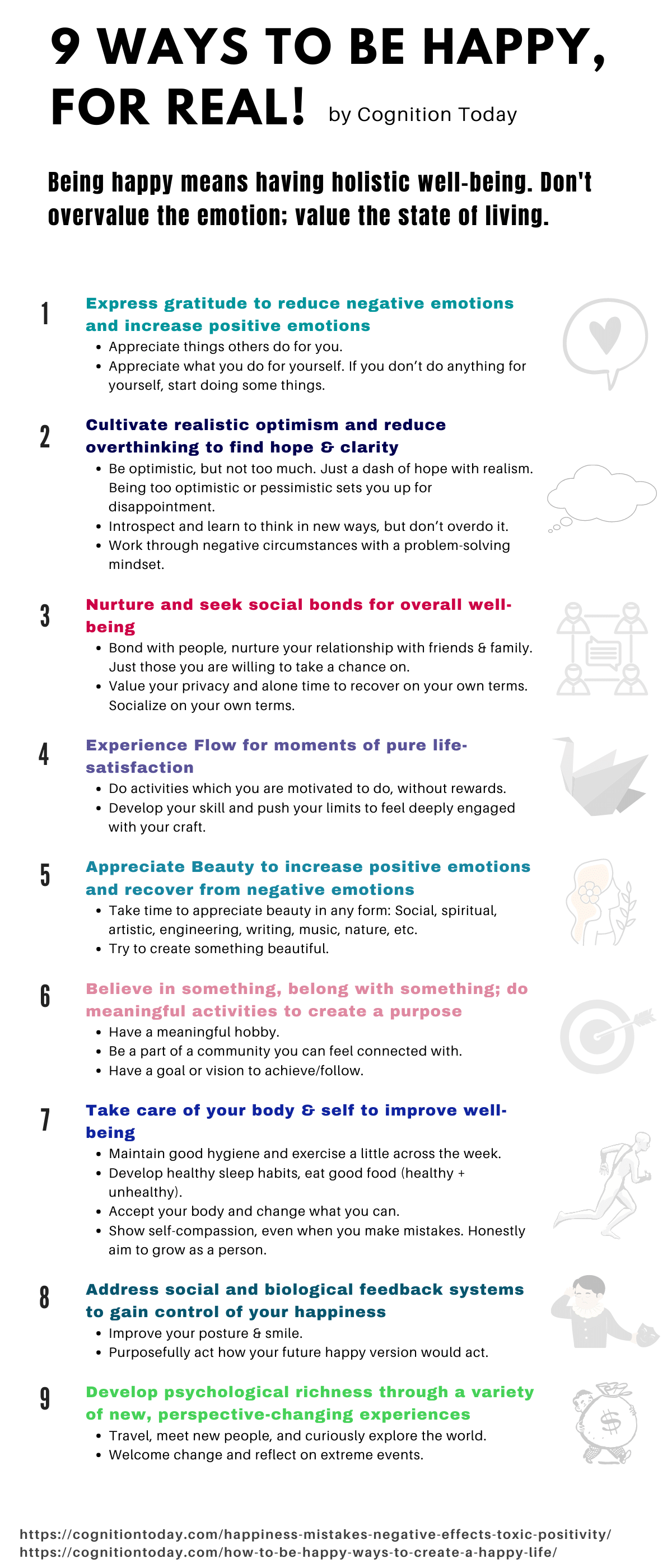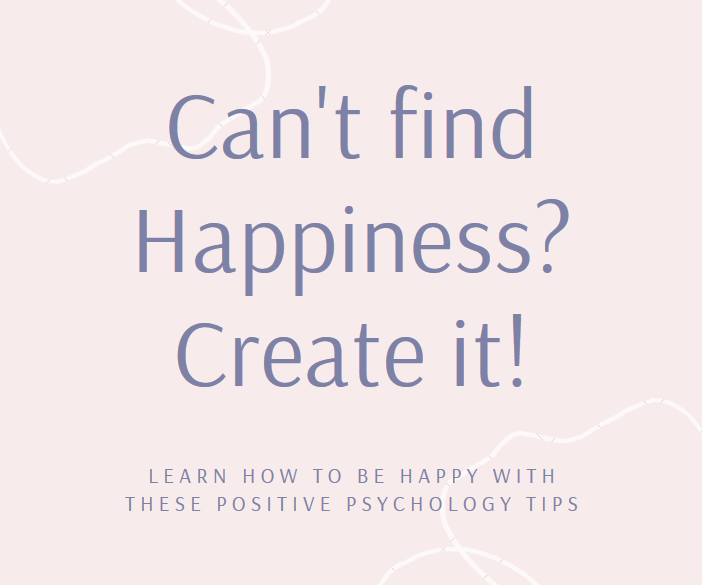What makes people happy, according to psychology? What should they do to live a happier life? Chasing happiness like it is some wellness race could actually backfire and make you unhappy. That is why people need to actively create their own happiness by focusing on emotions, a better quality of life, improved life satisfaction, and overall well-being.
- Highlights
- What is happiness?
- 1. Express gratitude to reduce negative emotions and increase positive emotions
- 2. Cultivate optimism and reduce overthinking to find hope & clarity
- 3. Nurture and seek social bonds for overall well-being
- 4. Experience Flow for moments of pure life-satisfaction
- 5. Appreciate Beauty to increase positive emotions and recover from negative emotions
- 6. Believe in something and do meaningful activities to create a purpose
- 7. Take care of your body & self to improve well-being
- 8. Address social and biological feedback systems to gain control of your happiness
- 9. Develop a psychologically rich life
- Sources
Highlights

What is happiness?
The common sense understanding is that happiness is a feeling. But to be specific, joy and pleasure are specific feelings. Happiness is a bigger category that is a little more complex. Happiness is a state of mind with respect to your environment that empowers you with a high frequency of positive emotions, constructive thoughts, satisfaction with pleasure, and healthy coping with hard times.
Research suggests living a happy life is a creative process. The person who seeks authentic happiness ‘creates’ it. Authentic happiness is a byproduct of psychological well-being, eudaimonic well-being, life satisfaction, fulfillment, and personal growth.
6 types of happiness
Well-being is not an absence of mental illness. Just like depression isn’t the opposite of happiness. It is an inner/mental and outer/physical[1] reality that includes[2] avoiding pain, adapting to the environment and stress, quality of daily functioning, realizing one’s potential, happy feelings, pleasure, social aspects, personal growth, satisfaction, and meaning in life.
You can think of 6 types of happiness based on how they contribute to your well-being.
- Eudaimonic well-being (Eudaimonia): Focuses on self-realization, meaning and purpose, and quality of functioning in life. High Eudaimonic well-being typically means better life satisfaction.
- Hedonic well-being: Focuses on gratification, pleasure, and pain avoidance. High hedonic well-being means a person has short-term happiness and pleasure.
- Psychological well-being: Focuses on personal mastery, autonomy, personal growth, positive relationships, meaning, and self-acceptance. High psychological well-being contributes to long-term happiness.
- Subjective well-being: Focuses on improving life satisfaction, positive emotions, and negative emotions. It is the cognitive and emotional evaluation of one’s physical and mental life. High subjective well-being contributes to the feeling that life is satisfying.
- Objective well-being: Focuses on wealth, health, education, social connections, and adjustment to one’s environment. Higher objective well-being comes from a person’s accumulation of financial, educational, and social resources.
- Psychological richness: Focuses on a variety of interesting and perspective-changing experiences. Higher psychological richness is an important part of a good life with less boredom, more memorable experiences, and excitement.
The bare minimum for good well-being
There is a simple theory called the PERMA model of well-being, which summarizes factors that contribute to happiness, life satisfaction, and improved quality of life. One of the most notable contributors to positive psychology – Martin Seligman – created it.
- P – Positive Emotion: How often do you experience positive feelings like joy, satisfaction, contentment, etc.?
- E – Engagement: How strongly do you feel engaged with people, activities, and experiences?
- R – Relationships: What is the strength and quality of relationships that make you feel good and satisfied?
- M – Meaning and Purpose: How do you connect with the world, find a sense of meaning & develop a broad vision to live a fulfilling life?
- A – Accomplishment: How strongly do you feel you have proudly accomplished something valuable and meaningful in life?
These 5 factors are most likely going to affect your sense of happiness, especially if it is already lost. Things like money, travel, physical health, and mental health improve or worsen your chances of success in PERMA factors.
How to live a happy life: 9 Research-based strategies

1. Express gratitude to reduce negative emotions and increase positive emotions
This is perhaps the simplest of all tips on how to be happier. Expressing gratitude is all about being thankful for things other people do that help or gratify you in some way. It is actively acknowledging the effort put in by others and extending a warm ‘Thank you.’ One benefit is that, while expressing gratitude, negative emotions like guilt, envy, and sorrow are deterred. During personal adversity or loss, being thankful for any small thing can help you cope with stress and grief. Thanking someone for their good deed encourages them to repeat a good deed, and it even bolsters your motivation to do the same. Expressing gratitude is the first step[3] you can take if you are unable to experience happiness for long periods of time.
Positive actions like expressing gratitude can also become a self-improvement force[4] by increasing connectedness, positive emotions, and good negative emotions like indebtedness and humility. Gratitude is associated with engaging in positive behaviors that can promote overall well-being.
A meta-analysis of research[5] studies shows that gratitude interventions promote psychological well-being. Gratitude interventions are deliberate activities centered around being thankful for the little and big things in life. Here are some ways to be thankful or express gratitude:
- Make a daily list of things you are thankful for, or maintain a gratitude journal
- Verbally tell others what you are thankful for
- Mentally acknowledge what you are grateful for
- Write thank-you notes
2. Cultivate optimism and reduce overthinking to find hope & clarity
Everyone suffers in some way and has disappointments in life. It’s a part of our existence to battle through tough times and emerge victoriously. Cultivating optimism is akin to being hopeful and striving to do whatever it takes to reduce your suffering so you can expect a better tomorrow. It’s a fight for a better future. The enemy of realistic optimism is overthinking. Overthinking can make you pessimistic by pushing you into a slippery slope of losing hope, which unnecessarily puts the focus on the negative aspects of life. It often prevents one from gaining insight into the problem and obscures positive outcomes.
If you want to stay happy and become a fully satisfied person, you shouldn’t ignore or deny negative emotions. Dealing with negative emotions and events can help build resilience. Dealing with ‘negativity’ in a healthy way is the key to sustaining a happy life. Negative experiences can lead to constant preoccupation with negative thoughts. Such thinking lowers life satisfaction. However, regulating emotions constructively and forgiveness[6] can improve life satisfaction. Just feeling happy and content once in a while won’t make you a happy person. The goal is to frequently experience happiness, satisfaction, and contentment, which means you have to accept and deal with negative emotions.
Overthinking can get a little tricky. Many of us overthink with a hint of self-reflection and rumination (revisiting existing maladaptive thoughts). One study points[7] out that constructive self-reflection can increase happiness, but only when self-reflection does not lead to rumination. So if you want to feel happy once again after forgetting what it feels like, reduce fixating on the past.
Caution: Don’t be unrealistically optimistic[8]. Be realistic and hopeful. Expecting too much all the time and then getting disappointed[9] can lower well-being & cause chronic unhappiness.
Related: Losing Hope? You need Waypower & Willpower
Dealing with negativity in a healthy way is the key to sustaining a happy life. Share on XThe brain is wired in such a way that our mental well-being is directly related to our social intimacy. Our species grows in society, not in isolation, as social bonding gives us a number of benefits. A system of mirror neurons (and/or other networks[10]) is dedicated[11] to social cognition. Talking with people helps us alleviate stress, cope with disasters, and mitigate feelings of loneliness. Investing in a relationship is a source of genuine happiness. Good friendships can make a day feel less empty, but it takes work. Social relationships help you adapt to your environment with the least amount of stress, even in situations involving death and heartbreak. Social bonds are fundamental[12] to living a happy life and improving one’s subjective well-being. Even though nurturing social bonds can make you happy, seeking much-needed alone time is just as important.
A study on over 5,000[13] people from The Netherlands explored personality, positive and negative life events, and social support in the context of flourishing and well-being (hedonic & eudaimonic). Flourishing is the idea that your life has gone beyond just maintaining well-being; it is booming. The analysis showed that social support and positive life events are associated with flourishing and subjective well-being. However, negative life events aren’t. Intuitively speaking, it appears, with common sense, that negative life events can make one unhappy, but the study did not find any link between well-being and negative events. The hedonic treadmill theory can explain why. It states that life events (positive and negative) only have a short-term impact on mood, well-being, and quality of life, and these factors quickly return to the baseline.
4. Experience Flow for moments of pure life-satisfaction
You may have heard people saying that they are in the zone: a rewarding period of intense concentration, satisfaction, timelessness, and oneness of the thoughts and activities you are doing. Researcher Mihaly Csikszentmihalyi describes this state in the best-seller book “Flow: The Psychology of Optimal Experience[14] as a ‘Flow’ state. Experiencing flow goes hand-in-hand with a number of desirable moods: satisfaction, frequent pleasure, joy, etc. All of those make your life conducive to happiness. The best way to enter the flow state is to stay engaged in a mildly challenging activity that you find naturally motivating and occupies your mind till everything else is zoned out. It’s a moment of high achievement and productivity.
5. Appreciate Beauty to increase positive emotions and recover from negative emotions
Our attention is limited, and our brains choose what to ignore. Most objects in our environment are ignored unless they are distracting and/or important. Take a moment and notice the beauty of objects around you. Notice the architecture of your workplace or the scent of a flower. Deliberate effort to appreciate beauty/art and immerse in it is a sure-shot way to have pleasurable moments. It is only when you observe and look for the good you see the good. Listening to music is one easy way to get started on appreciating beauty and aesthetics.
Evidence shows[15] that appreciating beauty and excellence is positively associated with improved well-being, improved life satisfaction, positive emotions, and better recovery from negative mental states.
Make an attempt to negate the confirmation bias as well. It is the tendency to selectively choose evidence that agrees with you. If you feel that the world is a grim place and life sucks, don’t look for evidence that proves your point. Look hard to find things you can appreciate. You will be able to live a happy life once you overcome the confirmation bias. Appreciating the beauty in all sorts of things can really open you up to frequent pleasurable experiences.
Acknowledging beauty and expressing gratitude are the two easiest ways to improve the quality of your life. Share on X6. Believe in something and do meaningful activities to create a purpose
Empirical research (discussed in the best-selling book “The How of Happiness[16]“) indicates that having a social/spiritual/religious belief system is positively correlated with having better well-being. This does not mean that you have to partake in religion. Any belief is fine if it makes you feel that you are a part of something larger, have something to look forward to, and something that promotes helping others. It is basically satisfying our deep-seated “need for belonging.” Our identity and worldview go beyond ourselves. Whether you look at the universe from the point of view of a spiritual quest or science or religious scriptures, any point of view with a sense of meaning can bring you feelings of safety, purpose, and unity in the context of the bigger picture.
Hobbies are meaningful activities, and research shows that such meaning can be a source of positive mood states. Singing and swimming, for example[17], can improve your mood, reduce stress, manage heart rate & blood pressure, and increase your energy. Even memes can be a meaningful anti-depression activity. Daily time spent on leisure activities is linked to higher subjective well-being[18]. The takeaway is pretty straightforward – spend time doing something you enjoy and find meaningful. That will increase the likelihood of a positive mood. Serious leisure is about having a sense of fulfillment and sincerity. Research shows[19] that leisure can promote global subjective well-being, which can enable you to experience authentic happiness.
Being a part of something larger than yourself can increase your chances of being happy in life. Be a part of a community. Create a purpose and have a vision. Share on XA study conducted on over 13,000 people[20] showed that pleasure, engagement, and meaning in life predict subjective well-being. Researchers also found that pleasure, engagement, and meaning predict well-being differently. Pursuing engagement and meaning contributes more to subjective well-being than pursuing pleasure. Another study[21] investigated daily diary records and found that people who partake in inherently meaningful and engaging endeavors improve their well-being more than those who partake in activities for pure pleasure/hedonic value. In fact, such eudaimonic activities can improve well-being the very next day.
Being a part of something bigger than yourself and investing time in meaningful activities can dramatically improve the quality of your life and eventually make you happy.
According to research on happiness, seek meaning, engagement, and purpose in an activity instead of only pleasure. But don't ignore pleasure. Need both for happiness. Share on X7. Take care of your body & self to improve well-being
It may be a cliché to say, “A Healthy body makes a healthy mind”, but nevertheless, tonnes of studies[22] support this notion. Exercise releases endorphins which make you feel revitalized. Another aspect is that your body image (how you perceive your body to be) is directly related to your sense of self and affects your self-esteem (attitude towards oneself). The better you feel about how you look, the better you feel about yourself. A simple goal you can maintain is exercising your body in fresh air 3 to 4 times a week. Sports activity, jogging or walking for 30 minutes, or even Yoga and Pilates at home can do wonders for how you feel about yourself. So to be happy, be physically healthy, and see your body in a positive light.
Protecting mental health starts with protecting your body because your mind is inseparable from the body. Mental health improves when you exercise, improve gut bacteria through diet, and manage fatigue and stress. On top of that, taking care of your body means accepting your unchangeable parts and choosing how you look, and also managing basic deficiencies because vitamins and minerals are needed for healthy brain functioning.
If you think your happiness is tied to your body, go ahead and take control of what you can. The rest only needs to be accepted. Eat well, drink water, and sleep well to help your body stay healthy. Show self-love & self-acceptance through positive affirmations. Staying happy requires staying happy in your body.
Having a mentally and physically active life can help you “super-age“, which is when your cognitive and physical health at 75+ years of age is similar to someone under 50. Most superagers have high life satisfaction because they are active and engaged.
A part of the human condition is a mechanism called ‘Fake it until you make it’. You must’ve heard the popular notion that simply smiling or acting extroverted can make you happy. Is it true? After a lot of back-and-forths between conflicting results, a meta-analysis of 138 studies[23] shows that smiling on purpose can make you happier. This happens via facial feedback, where information derived from facial expressions informs and modifies a mental state. However, the smiling effect is mild and highly variable. Smiling can uplift your mood and make you happy, but it isn’t a panacea for sadness. The link between extroversion and well-being is not as simple as that between smiling and happiness because social support, sharing of emotions, and assertive and deliberate behavior can uniquely contribute to overall well-being. The extroverted/outgoing personality characteristics can be both faked and learned.
Simply tell yourself that you are having a good day, and you could have one. This is governed by the Galatea effect. It says when you have certain expectations about yourself, those expectations affect your success rate. It’s a special case of the self-fulfilling prophecy.
It is difficult to stay in a bad mood if you sit upright and expand your body posture. A stooped seating posture[24] enhances negative emotions. You don’t want that. Instead, make it a habit to walk and sit upright. An upright posture can help you recover from negative mood states as well.
Your happiness depends on your body according to research. Take care of it and physically experience it. Even walking upright can shield you from a bad mood. Share on X9. Develop a psychologically rich life
Along with eudaimonia (a meaningful life) and hedonia (short-term gratification), a third core aspect of a good life is psychological richness. A psychologically rich life has a variety of experiences and perspective-changing moments that keep things interesting and diverse. These experiences often come from meeting new people, traveling, moving cities, extreme events that change perspectives, etc. These not only help with new relationships but also give new ways of thinking, new perspectives, and a richer mental life. Psychological richness also includes having an open, curious, exploratory, and holistic mind that is ready to engage with novelty in the world. In fact, a significant amount of people (around 30%) believe that undoing their biggest regrets could make their lives psychologically richer.
Steps to get a psychologically rich life:
- Have rich experience
- Accept changes to perspectives
- Welcome novelty and changes
- Make changes when things get dull
- Take moderate risks and explore the world
- Ask questions to know and learn more
- Talk with people and welcome things outside your comfort zone
- Reflect on extreme events and how they affected you
Sources
[2]: https://www.annualreviews.org/doi/abs/10.1146/annurev.psych.52.1.141
[3]: https://amzn.to/32RrEX4
[4]: https://journals.sagepub.com/doi/10.1177/1754073916669596
[5]: https://pubmed.ncbi.nlm.nih.gov/26575348/
[6]: https://www.sbp-journal.com/index.php/sbp/article/view/4815
[7]: https://aps.onlinelibrary.wiley.com/doi/abs/10.1080/00049530701447368
[8]: https://www.sciencedirect.com/science/article/pii/S0960982211011912
[9]: https://journals.sagepub.com/doi/full/10.1177/0146167220934577
[10]: https://pubmed.ncbi.nlm.nih.gov/19199415/
[11]: https://www.annualreviews.org/doi/abs/10.1146/annurev.psych.60.110707.163604
[12]: https://www.sciencedirect.com/science/article/abs/pii/S0378873313000415
[13]: https://link.springer.com/article/10.1007/s10902-015-9647-3
[14]: https://amzn.to/3px5zal
[15]: https://psycnet.apa.org/record/2015-56619-001
[16]: https://amzn.to/32RrEX4
[17]: https://bpspsychub.onlinelibrary.wiley.com/doi/abs/10.1348/000711201160849
[18]: https://www.tandfonline.com/doi/abs/10.1080/02614360903434092
[19]: https://link.springer.com/article/10.1007/s10902-013-9435-x
[20]: https://www.tandfonline.com/doi/abs/10.1080/17439761003794130
[21]: https://psycnet.apa.org/record/2008-03005-004
[22]: https://www.cambridge.org/core/journals/public-health-nutrition/article/influence-of-physical-activity-on-mental-wellbeing/3C363AEECE5C8CAC490A585BA29E6BF8
[23]: https://doi.apa.org/doiLanding?doi=10.1037%2Fbul0000194
[24]: https://pubmed.ncbi.nlm.nih.gov/27626675/

Hey! Thank you for reading; hope you enjoyed the article. I run Cognition Today to capture some of the most fascinating mechanisms that guide our lives. My content here is referenced and featured in NY Times, Forbes, CNET, and Entrepreneur, and many other books & research papers.
I’m am a psychology SME consultant in EdTech with a focus on AI cognition and Behavioral Engineering. I’m affiliated to myelin, an EdTech company in India as well.
I’ve studied at NIMHANS Bangalore (positive psychology), Savitribai Phule Pune University (clinical psychology), Fergusson College (BA psych), and affiliated with IIM Ahmedabad (marketing psychology). I’m currently studying Korean at Seoul National University.
I’m based in Pune, India but living in Seoul, S. Korea. Love Sci-fi, horror media; Love rock, metal, synthwave, and K-pop music; can’t whistle; can play 2 guitars at a time.




























It is very important for us to be happy. Your article has been enlightening and fun to read and I am grateful so thank you for sharing. You would love this article.
Great article Aditya. All points are meaningful.Just wanted to add in simple words what my experience says is that living in current moment with all points mentioned in article with positivity and smartness is main reason for our happiness and living in a moment with a positive thought itself is the zone. Great efforts.
Thank you Kapil:) Yeah, a smart and positive outlook does help!
One is essentially happy unless in immediate physical danger or in acute physical pain. What one calls unhappiness is psychological discomfort due to something not happening as you wish or on facing uncertainty. And psychological comfort-discomfort is the non-stoppable process, the sign of being alive. One is essentially at rest unless in immediate physical danger. This rest is always with you.
its great as your other posts : D, appreciate it for putting up.
Hey buddy, must have been a hard road to reach this state of giving up. Giving up usually isn't useful or helpful when it comes to mental health. It doesn't feel good to give up, I'm sure you can do a number of things to not feel this way.
Greed to an extent and even selfish behavior can do some good. During the hardest times, we usually have ourselves. It makes sense to put yourself first at times. But greed can also be toxic to yourself and others, so be careful:)
Please do reach out if you need some help. My email is on the contact me page.
Too bad one had to pay to recurve the help needed. One of the main reasons I'm about to give up. But whatever, greed is great huh